The Incomparable Journey of Jewell Loyd
Seattle Storm All-Star guard Jewell Loyd had the perfect pair of sneakers for the occasion of Oct. 6, 2020. Entering Game 3 of the WNBA finals, looking to sweep the Las Vegas Aces and claim her franchise’s second title in three seasons, Loyd debuted the player exclusive, all-gold Nike Kobe 5s. That night, she scored 19 points and recorded nine rebounds in Seattle’s 92–59 series-clinching victory. As green-and-yellow confetti rained down to the floor of the near-empty Court I in Bradenton, Fla.’s IMG Academy, Loyd thought almost immediately of Bryant and his late daughter, Gianna. “This is what [me and Kobe] talked about, how to get this feeling,” Loyd says. “How to get this feeling over and over again.”
Loyd is known as “The Gold Mamba,” a nickname Bryant bestowed upon the now 27-year-old in 2015, when she turned pro. To Loyd, the moniker conveys that “the value you have, your purpose and your drive is unique.” In that regard, it’s a fitting sentiment. Loyd describes herself as different. “That’s something that I embrace,” she says.
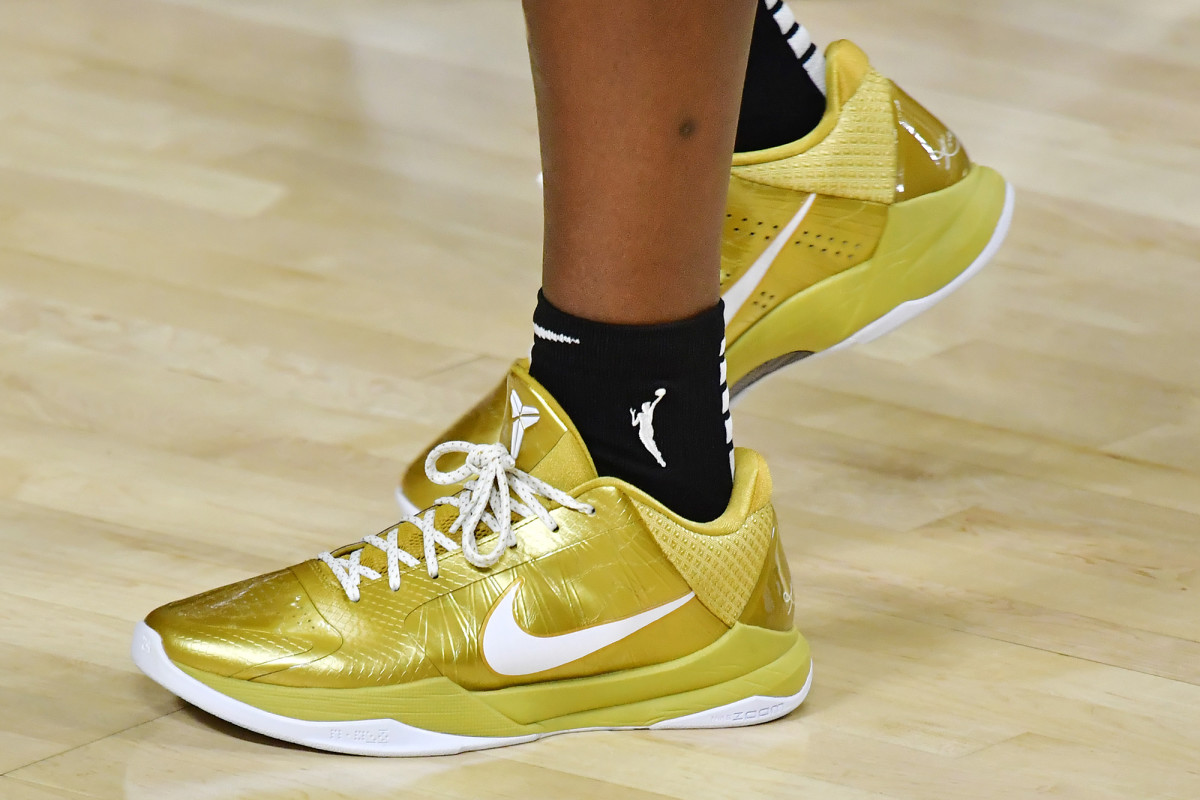
In her six seasons in the WNBA, Loyd has fashioned an impressive on-court résumé: two titles, two All-Star Game appearances, an All-WNBA team recognition and a Rookie of the Year award. She is also one of the faces of Bryant’s Nike line of basketball sneakers. “You watch her for two seconds and you know that she’s a special player,” says Storm teammate Sue Bird.
But to arrive at her success, Loyd had to learn to embrace the adversity around her. She has dyslexia, something she describes as “a daily struggle.” And consistency issues have plagued the majority of her professional career. She says the death of Bryant and his daughter made her rethink her priorities. “My vulnerability is a good thing,” Loyd says. “It’s not a weakness—it’s a strength.” And this past season, with the WNBA’s dedicating its campaign to Breonna Taylor and the Say Her Name movement, she embraced being a vocal, Black female athlete. Coming out of Seattle’s most recent championship, Loyd is more comfortable with who she is.
“She does a lot of things similar to Kobe,” Bird says. “But right now, she’s Jewell Loyd. And this is Jewell’s game.”
***
When Loyd was 10, she wanted to be the next Venus or Serena Williams. Her father, Calvin, was her first tennis coach, and she worked on her forehand at a local camp in the north and northwest suburbs of Chicago. “[The Williams sisters] are my role models,” Loyd told the Chicago-area Pioneer Press after winning a tournament in May 2004. “I watch them on TV and I try to do what they do.” Claiming a Wimbledon title was one of her first athletic goals.
But while tennis served as her introduction to sports, she grew to find it lonesome. She moved to team sports, whether that was baseball, tackle football—a favorite of hers at recess—or basketball. “I saw the joy that it brought to not just me, but my friends,” Loyd says.
That desire to bring the best out of others is something Bird has observed all these years later. “That’s always the essence of Jewell,” Bird says. “Just like a really sweet, good person.”
But competition was also an integral part of Loyd’s childhood. She competed with her parents and with her older brother, Jarryd, who is more than seven years her senior. Family card games were intense and so too were household challenges. “We would create lots of games,” says Jewell’s mother, Gwen Davis-Loyd. “We even made homework competitive.”
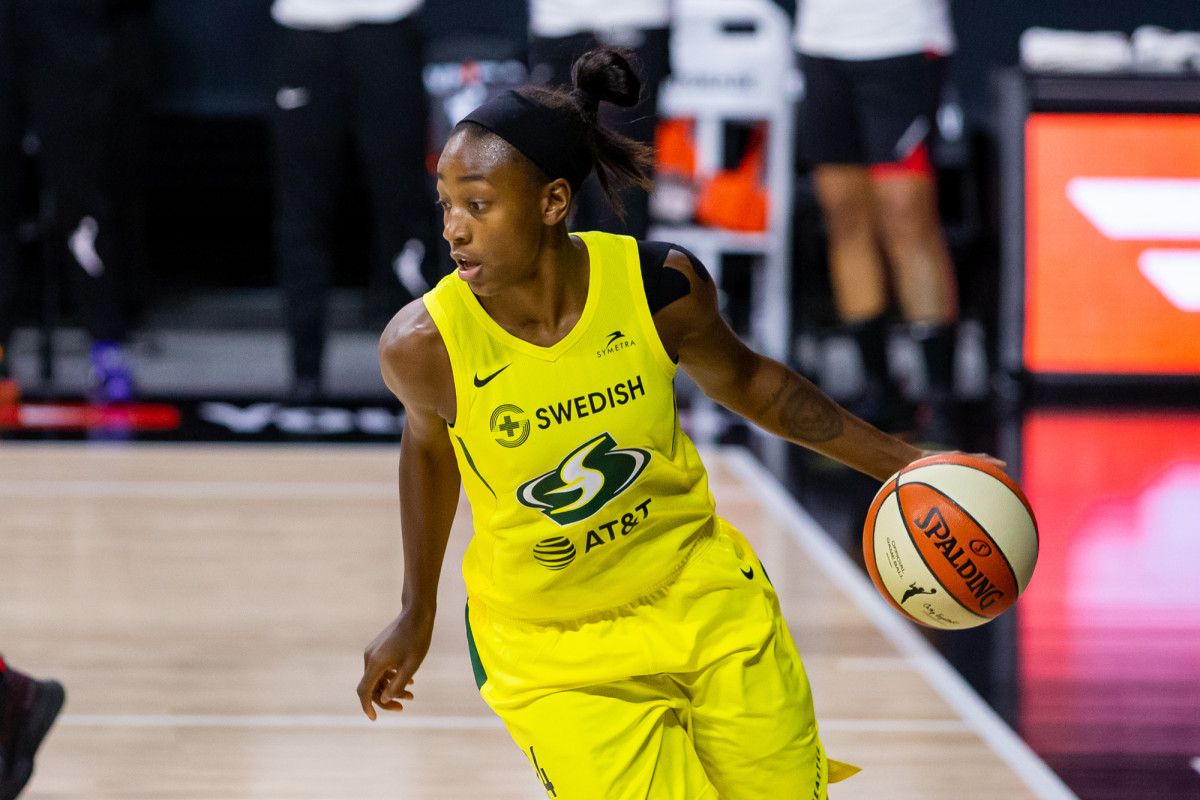
Academics first, playtime later, was one of the principles with which Davis-Loyd parented. She was a long-time Chicago-area educator, teaching in middle and high school, creating educational curriculums and serving as a reading specialist.
Around the second grade, Loyd started realizing that it took her a long time to finish reading homework assignments. When teachers would ask students to take home books, she always took home picture books. “That was the easiest way for me to understand things,” Loyd says. “And at times when I was asked to bring home books that had a lot of words in it, I would just try to summarize it and act like I was reading it, act like I understood what’s going on.”
In reality, though, she had no clue.
“Why am I struggling?” she thought to herself.
When she learned of her dyslexia diagnosis—which drastically impacted her comprehension issues—at age 12, she was a budding basketball star. She worried about how her peers would react. “How am I supposed to tell my friends that I had this?” she thought. “Is this going to change everything?”
Loyd wondered whether she would have to take a different school bus or even attend another school. But at Niles West High School in Skokie, Ill., she says she had several teachers who understood her learning issues and supported her.
“It doesn’t change how I think,” Loyd says. “It doesn’t change who I am. I just needed more time.”
She has embraced her dyslexia and is now an advocate for others on the topic. In March 2016, she was featured on a 32-story Times Square billboard as the face of Eye to Eye’s “ShareAbility” campaign, which encouraged others to share their stories about learning disabilities. Her mother says Loyd has also given out her phone number to children with disabilities.
“You have to understand you have to love yourself,” Loyd says. “And as a leader you always have to express that to people. That’s not just about the medals and the MVPs and the trophies. It’s what you can pass down, the knowledge. And so if I could do that and if I could make someone smile, if I could change someone’s view, if I could help them reach their goal, that’s what I’m supposed to do. Because I had people who did that for me.”
***
On Nov. 9, 2018, when Loyd was overseas playing in Turkey, she got a text from Bryant. “What’s your email?” he asked her. After an hour of waiting, Loyd checked her inbox again. The Lakers star had sent her a PDF of his first Wizenard book, which Loyd downloaded. “Read this and let me know what you think, maybe hit me up in a month,” Bryant said.
“A month to finish this 700-page book! Your first novel,” Loyd thought. “Do I tell him I’m not gonna read this, ’cause this is unbelievable. I hate reading. This is such a struggle for me.”
About a week later, after combing through the first 30 pages, Bryant checked back on her progress.
“Kobe, this is hard,” she told him.
“You gotta read it,” he replied. “You gotta face your fears. That’s what this book’s about. That’s why I sent it to you. It’s all about overcoming your fears and understanding who you are and how you use those things to motivate yourself to excellence.”
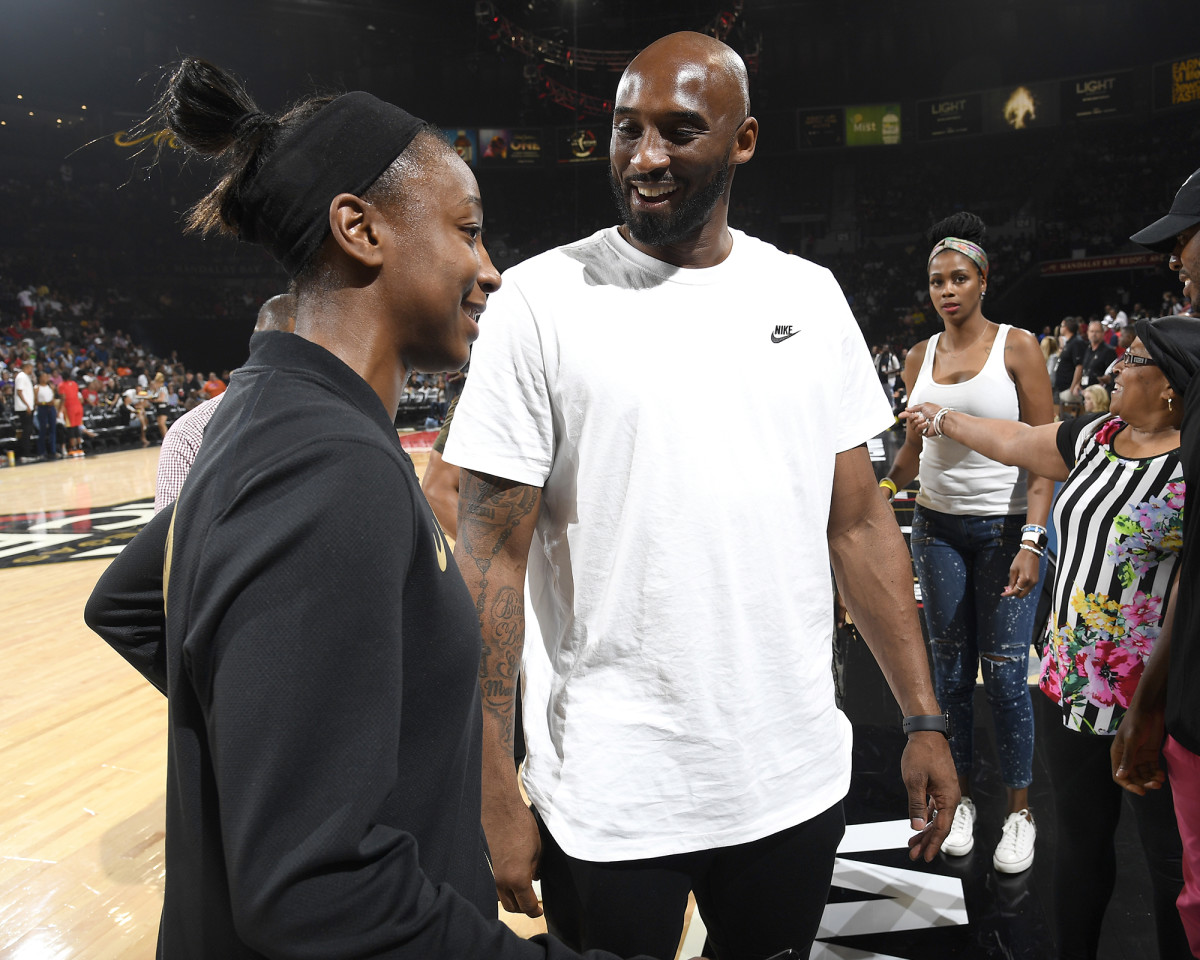
She couldn’t let him down.
“I don’t think he fully understood the confidence that he gave me to continue to read and get out of my comfort zone,” Loyd says. “He pushes me in so many different ways, but this one was different because it was non-basketball-related—completely non-basketball-related.”
Loyd first met Bryant in person on the night of the 2015 Wooden Awards. At that time, she was preparing to leave Notre Dame after her junior year and turn pro. But she had already built a relationship with the Lakers, sending him frequent questions about basketball over Twitter. She proudly states she was Bryant’s 96th follower. And throughout college, she would write “Mamba Mentality” on her sneakers.
In the ensuing years, Bryant was always an open lifeline to Loyd. “He was so willing to help me,” she says.
Phil Handy, a current Lakers assistant coach and someone who worked closely with Bryant toward the end of his playing career and has recently trained Loyd, says that like Bryant, Loyd has the appetite to be great.
“That’s one of the reasons that her and Kobe got along so well,” Handy says. “That whole Mamba thing is in her. It’s real.”
During workouts, Handy picks up on Loyd’s strong eye contact and how in real time she looks to figure out how different moves fit into her game. “That reminds me of Kobe,” he adds. Bird notes that like Bryant, Loyd is a “sponge,” always looking to soak up information.
In July 2018, the Lakers star focused an episode of his ESPN+ show Detail on the Storm guard, breaking down not only her offense, but her footwork and defense. Loyd says being the subject of it was “an honor.”
“He made you feel like you were so special,” Loyd says. “Like you were the main attraction.”
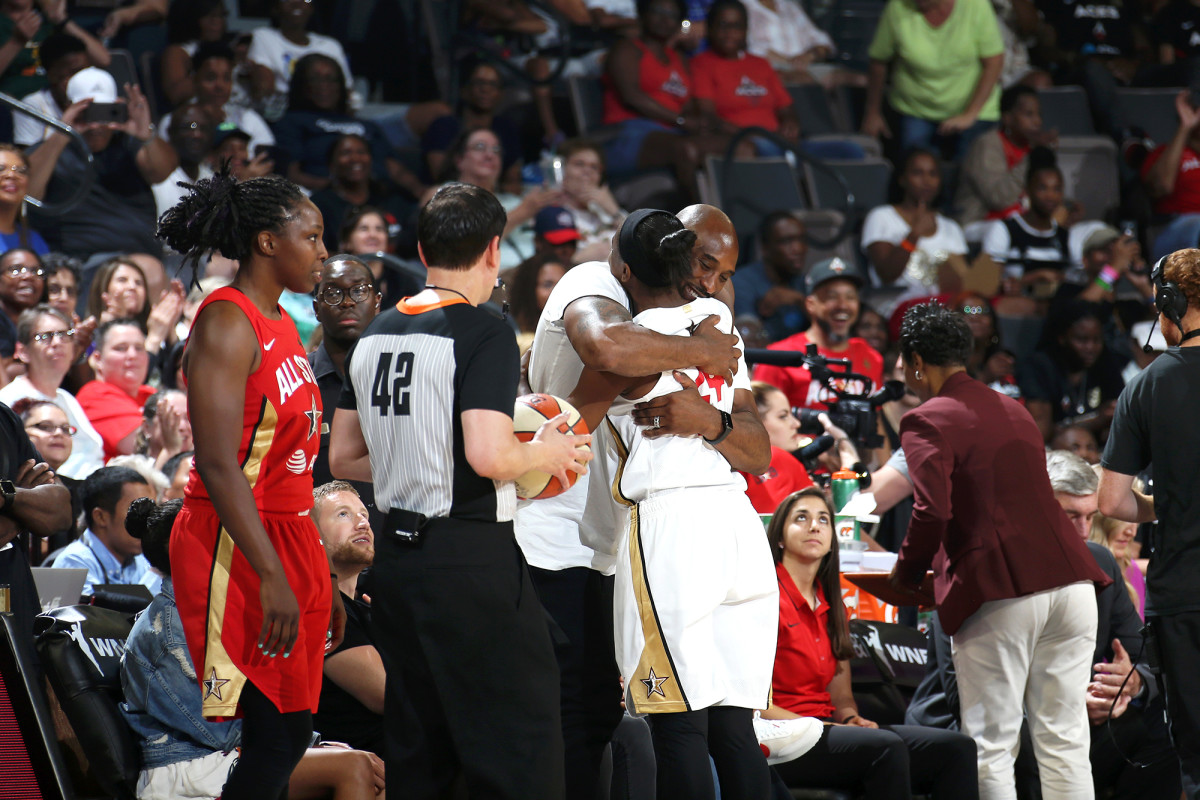
Loyd was in Spain playing for Perfumerias Avenida when she learned of the Jan. 26 helicopter crash that killed nine people, including Bryant. Perfumerias had just knocked off Valencia behind an 18-point, six-rebound effort from Loyd when coaches in attendance alerted her to the news. She felt nauseous and numb as she sifted through the countless messages on her phone. She called her brother and continuously broke down in tears.
His death still hurts. But Loyd is working through her grief. “We don’t quit and we don’t cower,” Loyd wrote in a letter following his death. “We endure and conquer.”
“I think it’s absolutely incredible that she’s able to carry that legacy,” Handy says.
***
Shortly after the 2015 WNBA draft, Loyd traveled to Seattle for a pre-training-camp visit. One evening, Bird took Loyd out to a local restaurant, welcoming the league’s No. 1 pick to the city. “She was so quiet and so shy,” Bird recalls. While together, the longtime Storm star remembers offering to buy Loyd a drink, but Loyd turned Bird down. “She just had this childlike innocence about her,” Bird says. “But she’s obviously grown up now.”
Handy has also taken notice of Loyd’s earnest nature, saying that she has a “great switch.” By that, the Lakers assistant means that Loyd is very “down to earth” off the floor, but is highly motivated on it.
“She is not playing when it comes to the game,” Handy says. “She wants to be great.”
Entering this year, Loyd knew she needed to be more consistent. She says that at times, she didn’t feel like herself throughout the 2019 season, when she was forced to make up for the injury absences of Bird and 2018 league MVP Breanna Stewart.
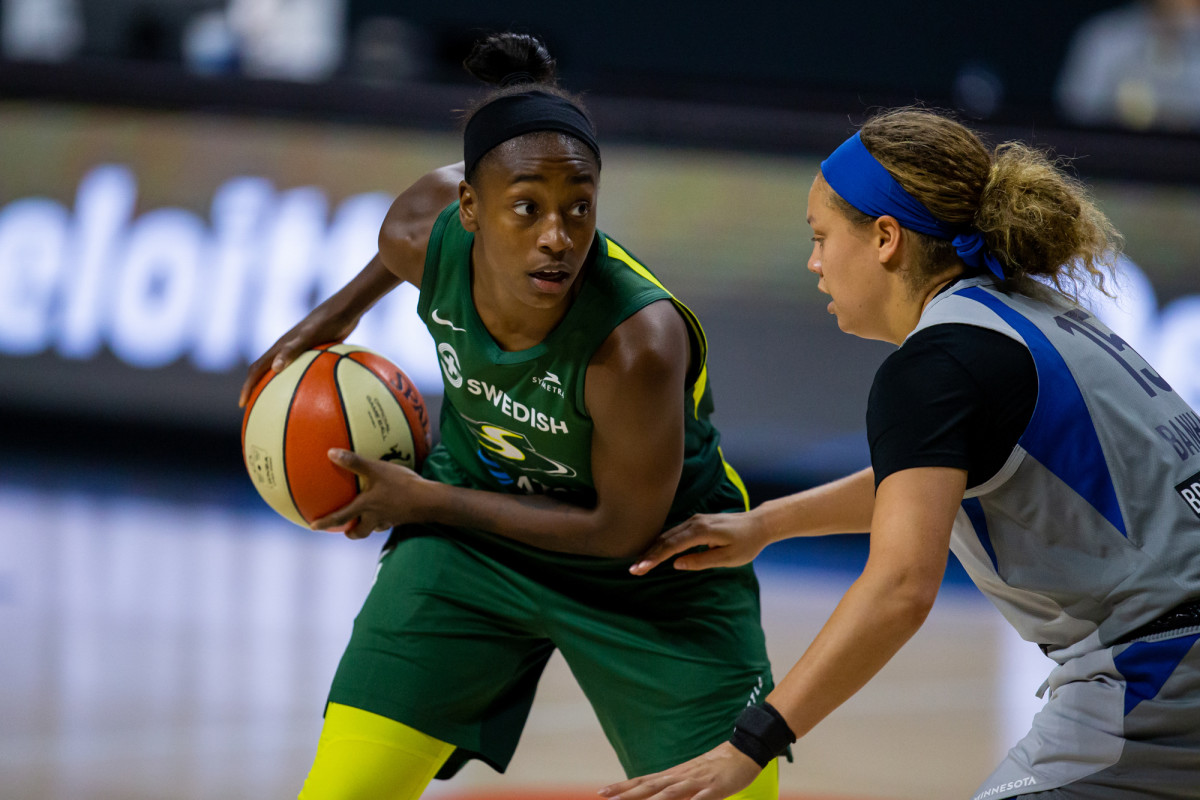
Loyd sought to improve the mental component of her game, so last spring, she decided she wanted an emotional support dog and adopted a goldendoodle puppy named Mikey Cristo. She spoke with Handy about strategies to improve her mentality and also consulted with George Mumford, a mindfulness and performance specialist who previously worked with Bryant, among other experts.
“Once Kobe passed, my focus really changed,” Loyd says. “My why changed, of why I’m playing the game and why I want to do this. And in a crazy, weird way, his passing really pushed me fully out of my comfort zone.”
This summer, in the WNBA’s most unusual season ever, Loyd and her teammates worked to make the Wubble feel more like home. Just like she had done with her parents as a child, Loyd engaged in competitive card games with her housemates. And she had a hyperbaric chamber installed in her room to help with the daily rehab process, much to the delight of Bird, who also took advantage of it.
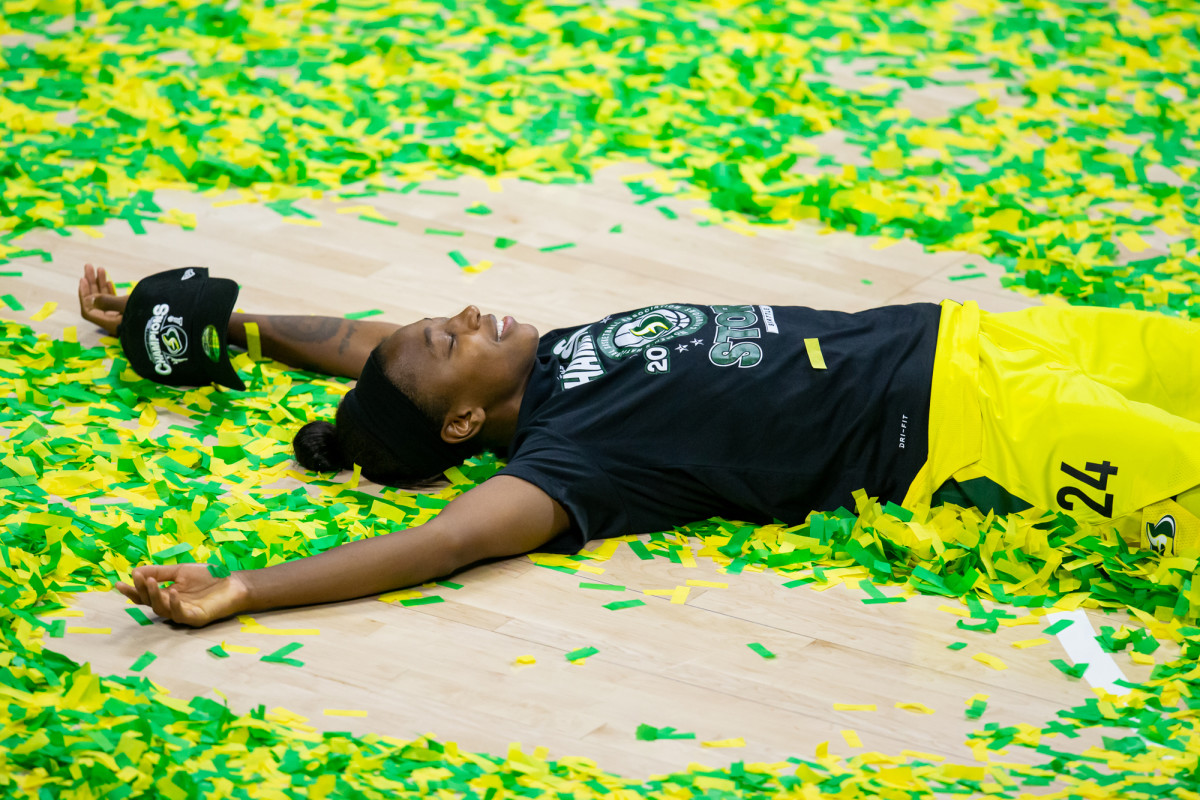
Throughout Seattle’s 22-game regular season, Loyd scored 20 or more points seven times, including a season-high 35 points vs. Indiana. She went on to score 19 or more points in four of Seattle’s six playoff games, including 28 vs. Las Vegas in Game 1 of the finals and 19 in Game 3.
Throughout the finals, Loyd texted with Handy, who urged the Storm guard to “manifest” the work that they had put in. Her mom, who in a normal year would spend the WNBA season in Seattle, showed her support by posting frequent karaoke parody videos on Twitter, rewriting the words of classic songs by using Storm-related names and phrases.
Finals 1 tonight- Game 1-Seattle v Aces- ESPN2 at 6 pm CT. Let’s go Storm! pic.twitter.com/1xKcKXwa6u
— Gwendolyn Loyd (@gwenloyd1) October 2, 2020
“For me, it’s normal,” Loyd says with a laugh. “The fact that everyone is now just seeing that is hilarious to me.” (Her mom notes that her daughter can also sing but would “never do it in public.”)
This offseason, Loyd has elected not to go overseas. She is instead focusing on not only improving her game, but also learning more about the business world and taking part in service-oriented work with her Loyd Foundation, which has helped communities in the Chicago area, where she grew up, and also in Rwanda, teaching people key entrepreneurial skills.
“Being a strong, Black female athlete is something that I never fully embodied or embraced until this season,” she says. “Understanding that I do have a story. I do have a voice. I have a platform to educate.”
Bird observes a more comfortable and confident person and in turn, a more consistent player. Loyd’s successes are no longer glimpses, but sustained periods of excellence. As she honors her mentor’s legacy, she’s working through her daily challenges and embracing her authentic self.
“She’s just leading the only way Jewell Loyd can,” Bird says. “Just the way she should be.”
For more from stories on the most powerful, most influential and most outstanding women in sports right now, check out Sports Illustrated's series The Unrelenting.
